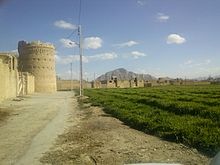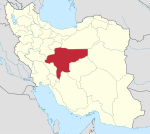Isfahan province: Difference between revisions
m →Islamic Azad Universities: clean up using AWB |
Rescuing 1 sources and tagging 0 as dead. #IABot (v1.3beta6) |
||
| Line 73: | Line 73: | ||
The Isfahan province covers an area of approximately 107,027 square km and is situated in the center of Iran. To its north, stand the [[Markazi Province|Markazi]] (Central) Province and the provinces of [[Qom Province|Qom]] and [[Semnan province|Semnan]]. To its south, it is bordered by the provinces of [[Fars Province|Fars]], and [[Kohgiluyeh and Boyer-Ahmad Province]]. [[Aminabad, Shahreza|Aminabad]] is the most southern city of Isfahan province just 2 km north of the border. To the east, it is bordered by the province of [[Yazd Province|Yazd]]. To the west, it is bordered by the province of [[Lorestan Province|Lurestan]] and to the southwest by the province of [[Chahar Mahal and Bakhtiyari]]. |
The Isfahan province covers an area of approximately 107,027 square km and is situated in the center of Iran. To its north, stand the [[Markazi Province|Markazi]] (Central) Province and the provinces of [[Qom Province|Qom]] and [[Semnan province|Semnan]]. To its south, it is bordered by the provinces of [[Fars Province|Fars]], and [[Kohgiluyeh and Boyer-Ahmad Province]]. [[Aminabad, Shahreza|Aminabad]] is the most southern city of Isfahan province just 2 km north of the border. To the east, it is bordered by the province of [[Yazd Province|Yazd]]. To the west, it is bordered by the province of [[Lorestan Province|Lurestan]] and to the southwest by the province of [[Chahar Mahal and Bakhtiyari]]. |
||
The city of Isfahan is the provincial capital; and the counties of this province are as follows: [[Aran o Bidgol]], [[Ardestan]], [[Esfahan (city)|Esfahan]], [[Lanjan]], [[Shahinshahr]] and [[Meymeh]], [[Khomeini Shahr]], [[Khvansar|Khansar]], (The Upper) [[Semirom]], [[Fereydan]], [[Fereydunshahr]], [[Falavarjan]], [[Kashan]], [[Golpayegan]], [[Mobarakeh]], [[Nain, Iran|Nain]], [[Najaf Abad]], [[Lower Semirom]] ([[Dehaghan]]), [[Shahreza]], [[Anarak]] and [[Natanz]]; 18 townships, 38 counties, 67 cities, and 2,470 villages in all. According to the census in the year 2006, the population of the province was 4,559,256 of which approximately 83.3 percent were urban residents and 16.7 percent resided in the rural areas. The literacy rate was 88.65 percent. In 2011 population of Isfahan grew up to 4,879,312.<ref>[http://www.amar.org.ir/Portals/1/Iran/90.pdf Selected Findings of National Population and Housing Census 2011]</ref> |
The city of Isfahan is the provincial capital; and the counties of this province are as follows: [[Aran o Bidgol]], [[Ardestan]], [[Esfahan (city)|Esfahan]], [[Lanjan]], [[Shahinshahr]] and [[Meymeh]], [[Khomeini Shahr]], [[Khvansar|Khansar]], (The Upper) [[Semirom]], [[Fereydan]], [[Fereydunshahr]], [[Falavarjan]], [[Kashan]], [[Golpayegan]], [[Mobarakeh]], [[Nain, Iran|Nain]], [[Najaf Abad]], [[Lower Semirom]] ([[Dehaghan]]), [[Shahreza]], [[Anarak]] and [[Natanz]]; 18 townships, 38 counties, 67 cities, and 2,470 villages in all. According to the census in the year 2006, the population of the province was 4,559,256 of which approximately 83.3 percent were urban residents and 16.7 percent resided in the rural areas. The literacy rate was 88.65 percent. In 2011 population of Isfahan grew up to 4,879,312.<ref>[http://www.amar.org.ir/Portals/1/Iran/90.pdf Selected Findings of National Population and Housing Census 2011] {{webarchive|url=https://web.archive.org/web/20130531210834/http://www.amar.org.ir/Portals/1/Iran/90.pdf |date=2013-05-31 }}</ref> |
||
The province experiences a moderate and dry climate on the whole, ranging between 40.6 °C and 10.6 °C on a cold day in the winter season. The average annual temperature has been recorded as 16.7 °C and the annual rainfall on an average has been reported as 116.9 mm. The city of Sepahan (Esfahan) however experiences an excellent climate, with four distinct seasons. |
The province experiences a moderate and dry climate on the whole, ranging between 40.6 °C and 10.6 °C on a cold day in the winter season. The average annual temperature has been recorded as 16.7 °C and the annual rainfall on an average has been reported as 116.9 mm. The city of Sepahan (Esfahan) however experiences an excellent climate, with four distinct seasons. |
||
Revision as of 06:29, 15 April 2017
Isfahan Province
استان اصفهان | |
|---|---|
 | |
 Location of Isfahan within Iran | |
| Coordinates: 32°39′28″N 51°40′09″E / 32.6577°N 51.6692°E | |
| Country | |
| Region | Region 2 |
| Capital | Esfahan |
| Counties | 22 |
| Area | |
• Total | 107,029 km2 (41,324 sq mi) |
| Population (2016)[1] | |
• Total | 5,120,850 |
| • Density | 48/km2 (120/sq mi) |
| Time zone | UTC+03:30 (IRST) |
| • Summer (DST) | UTC+04:30 (IRST) |
| Main language(s) | Predominantly Persian. Minority: Bakhtiari Luri, Qashqai, Georgian, Armenian languages in some regions of the province |
| Website | [2] |
| Year | Pop. | ±% |
|---|---|---|
| 2006 | 4,559,256 | — |
| 2011 | 4,879,312 | +7.0% |
| 2016 | 5,120,850 | +5.0% |
| amar.org.ir | ||
Isfahan province (Template:Lang-fa), also transliterated as Esfahan, Espahan, Isfahan, or Isphahan, is one of the thirty-one provinces of Iran. It is located in the center of the country in Iran's Region 2.[2] Its secretariat is located in the city of Isfahan.
Geography
The Isfahan province covers an area of approximately 107,027 square km and is situated in the center of Iran. To its north, stand the Markazi (Central) Province and the provinces of Qom and Semnan. To its south, it is bordered by the provinces of Fars, and Kohgiluyeh and Boyer-Ahmad Province. Aminabad is the most southern city of Isfahan province just 2 km north of the border. To the east, it is bordered by the province of Yazd. To the west, it is bordered by the province of Lurestan and to the southwest by the province of Chahar Mahal and Bakhtiyari.
The city of Isfahan is the provincial capital; and the counties of this province are as follows: Aran o Bidgol, Ardestan, Esfahan, Lanjan, Shahinshahr and Meymeh, Khomeini Shahr, Khansar, (The Upper) Semirom, Fereydan, Fereydunshahr, Falavarjan, Kashan, Golpayegan, Mobarakeh, Nain, Najaf Abad, Lower Semirom (Dehaghan), Shahreza, Anarak and Natanz; 18 townships, 38 counties, 67 cities, and 2,470 villages in all. According to the census in the year 2006, the population of the province was 4,559,256 of which approximately 83.3 percent were urban residents and 16.7 percent resided in the rural areas. The literacy rate was 88.65 percent. In 2011 population of Isfahan grew up to 4,879,312.[3]
The province experiences a moderate and dry climate on the whole, ranging between 40.6 °C and 10.6 °C on a cold day in the winter season. The average annual temperature has been recorded as 16.7 °C and the annual rainfall on an average has been reported as 116.9 mm. The city of Sepahan (Esfahan) however experiences an excellent climate, with four distinct seasons.
With an elevation of 4,040 metres, the Shahankuh is the highest peak in Isfahan Province. This mountain is located about 20 kilometres southwest of the city of Fereydunshahr in the western part of Isfahan Province.
History and culture



Historians have recorded Espahan, Sepahan or Isfahan initially as a defense and military base. The security and protection of the gradually increasing castles and fortifications, thereby, would provide the protection of residents nearby, therefore leading to the growth of large settlements nearby. These historical castles were Atashgah, Sarooyieh, Tabarok, Kohan Dej, and Gard Dej to name a few. The oldest of these is Ghal'eh Sefeed and the grounds at Tamijan from prehistoric times. The historic village of Abyaneh, a nationwide attraction, also has Sassanid ruins and fire temples among other historical relics.
During the 17th and 18th centuries, Isfahan province enjoyed high standards of prosperity as it became the capital of Safavid Persia. While the city of Sepahan (Esfahan) was their seat of monarchy, Kashan was their place of vacation and leisure.
Isfahan province encompasses various sects today. The majority of the people in the province are Persian speakers, but Bakhtiari Lurs, Georgians, Armenians, Qashqais and Persian Jews also reside in the province. The official language of the province is Persian, though different ethnic groups and tribes abide by their own language such as Judeo-Persian, Armenian, Georgian, Qashqai Turkic or Bakhtiari Lurish. Isfahan province is noted for its reputed personalities such as writers, poets and other eminent figures who have been born and brought up or have lived in this territory.
Education
Public Universities
- Isfahan University of Technology
- Isfahan University
- Isfahan University of Medical Sciences
- Kashan University of Medical Sciences
- Isfahan University of Art
- Malek-Ashtar University of Technology
- University of Kashan
Islamic Azad Universities
Several well-known Islamic Azad University campuses in Iran are located in the province:

- Islamic Azad University of Falavarjan [4]
- Islamic Azad University of Meymeh
- Islamic Azad University of Kashan
- Islamic Azad University of Majlesi
- Islamic Azad University of Shahreza
- Islamic Azad University of Najafabad
- Islamic Azad University of Khomeynishahr
- Islamic Azad University of Isfahan [5]
- Islamic Azad University of Khorasgan [6]
See also
References
- ^ "National census 2016". amar.org.ir. Retrieved 2017-03-14.[]
- ^ "همشهری آنلاین-استانهای کشور به ۵ منطقه تقسیم شدند (Provinces were divided into 5 regions)". Hamshahri Online (in Persian). 22 June 2014 (1 Tir 1393, Jalaali). Archived from the original on 23 June 2014.
{{cite news}}: Check date values in:|date=(help); Unknown parameter|deadurl=ignored (|url-status=suggested) (help) - ^ Selected Findings of National Population and Housing Census 2011 Archived 2013-05-31 at the Wayback Machine
- ^ http://iaufala.ac.ir/index.aspx?lang=2&sub=0
- ^ "khuisf.ac.ir". khuisf.ac.ir. Retrieved 2013-08-11.
- ^ [1]
Bibliography
- Albert Houtum-Schindler (1897). "Province of Isfahan". Eastern Persian Irak. London: J. Murray and Royal Geographical Society. pp. 119+ – via HathiTrust.
Further readings on the Georgians of Isfahan Province
- Muliani, S. (2001) The Georgians’ position in the Iranian history and civilization (Jaygah-e Gorjiha dar Tarikh va Farhang va Tammadon-e Iran) , Sepahan (Esfahan): Yekta
- Rahimi, M.M. (2001) The Georgians of Iran; Fereydunshahr (Gorjiha-ye Iran; Fereydunshahr), Sepahan (Esfahan): Yekta
- Sepiani, M. (1979) Georgian Iranians (Iranian-e Gorji), Sepahan (Esfahan): Arash
- Isfahan's tourist exhibition mentions the Georgians from Fereydunshahr and Fereydan. The report of this exhibition is available in the web site of the Iranian Cultural Heritage News agency.[1]
- Saakashvili visited Fereydunshahr and put flowers on the graves of the Iranian Georgian martyrs' graves, showing respect towards this community[2]
External links
- Official website
- Province of Esfahan on Iran Chamber Society
- Esfahan Travel Attractions
- Isfahan Cultural Heritage Organization
- Isfahan Province Department of Education
- Isfahan information and pictures
- IsfahanEast.com
- Naein News
- ^ [3] Archived April 3, 2007, at the Wayback Machine
- ^ [4] Archived November 29, 2005, at the Wayback Machine

